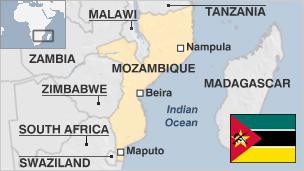
-
3 March 2015
- From the section Africa

Since independence from Portugal in 1975, Mozambique has been battered by civil war, economic mismanagement and famine.
A peace deal in 1992 ended 16 years of civil war, and the country has made much progress in economic development and political stability.
Portugal began to colonise the area that became Mozambique in the early 16th century. An anti-authoritarian coup in 1974 in Portugal ended colonial rule and its ten-year war with the Frelimo independence movement.
Mozambican support for armed groups fighting the white-minority rule governments in Rhodesia and South Africa led to those two countries sponsoring the Renamo movement, which fought Frelimo in the 1977-1992 civil war.
This conflict, combined with Rhodesian and South African intervention and central economic planning by the Marxist leadership of Frelimo left the country in chaos. About a million people died in the civil war and millions more fled abroad or to other parts of the country.
An attempt to secure a ceasefire with South Africa in the Nkomati Accord of 1984 broke down, and the government and Renamo eventually began talks brokered first by Christian groups and then by the United Nations. Frelimo inaugurated a new constitution in 1990 that enshrined free elections, and both sides signed the resulting Rome Peace Accords of 1992.
Frelimo has won all subsequent elections, some of which have been disputed by Renamo and smaller opposition groups. Political life has nonetheless remained stable, with Renamo continuing to work within the constitutional system.
The country has emerged as one of the world’s fastest growing economies, with foreign investors showing interest in Mozambique’s untapped oil and gas reserves. Coal and titanium are a growing source of revenue.
Most of the population works the land, however, and infrastructure nationwide still suffers from colonial neglect, war and under-investment.
The economy suffered serious setbacks when in 2000 and 2001 Mozambique was hit by floods which affected about a quarter of the population and destroyed much of its infrastructure.
Furthermore, in 2002 a severe drought hit many central and southern parts of the country, including previously flood-stricken areas. Poverty remains widespread, with more than 50% of Mozambicans living on less than $1 a day.
